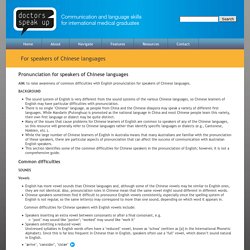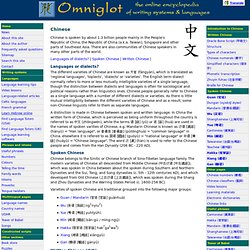

Viewcontent.cgi?article=1068&context=honors&sei-redir=1&referer= For speakers of Chinese languages. AIM: to raise awareness of common difficulties with English pronunciation for speakers of Chinese languages.

The sound system of English is very different from the sound systems of the various Chinese languages, so Chinese learners of English may have particular difficulties with pronunciation. There is no single ‘Chinese’ language, as people from China and the Chinese diaspora may speak a variety of different first languages. While Mandarin (Putonghua) is promoted as the national language in China and most Chinese people learn this variety, their own first language or dialect may be quite distinct.
From the Classroom: Working with Chinese ELLs. Home > ELL Topics from A to Z > From the Classroom: Working with Chinese ELLs By: Xiao-lin Yin-Croft (2008) Xiao-lin Yin-Croft is a third-grade ELL teacher of Chinese bilingual students at Ulloa Elementary School in San Francisco.

Originally from China, Xiao-lin learned English as an adult and now helps young Chinese students in the U.S. bridge the cultural and language gap that they face from an early age. In this article written exclusively for Colorín Colorado, Xiao-lin shares some insights on ways that teachers can work effectively with Chinese students and parents, as well as some of her own classroom strategies for working with bilingual students. While some of these strategies are culturally/linguistically-specific, many can serve as a model when working with students from diverse backgrounds.
ELL teachers face a unique challenge. English pronunciation practice for Chinese speakers. How to Teach English Pronunciation to the Chinese. Methodology: teaching rhythm and stress with Chinese students. By Jonathan Marks Advice and suggestions on how to teach rhythm and stress to Chinese students.

I'm a TESOL student doing teaching practice with Chinese students at Wolverhampton University. I want to know how to help then specifically with rhythm and stress in order to help them more like native speakers and less 'staccato'. Helen Petit English and Chinese pronunciation are very different in lots of ways (for a summary, see Swan & Smith 1987) and the impression of staccato-ness arises from a combination of various factors, all of which require plenty of work. Syllable structure linking vowel length stress and unstress It's a tough agenda, and all I can do here is give a few hints and examples which I hope will be of some use. Syllable structureIn the speech of Chinese speakers, final plosives such as p, t, k tend to be glottalised and unreleased. A helpful technique here is to play with shifting the word boundaries, getting them to say: gzzzzzz psssssss link_it_up ('lin-ki-tup') Vowel length.
Teaching English to Chinese Students. Last Updated on 11 November 2010 Difficulties Faced By Chinese EFL Students Many researchers in the fields of psycholinguistics and cognitive psychology believe that there is a "critical period" within we must be exposed to a language in order to become a native speaker of it, i.e., to speak that language naturally and without an accent.

For those who subscribe to this theory, that critical period is typically defined as comprising the first six years of life. It is further held that students who are exposed to a foreign language between the ages of six through puberty will experience increasing difficulties with that language, especially in regard to grammar and pronunciation. Chinese EFL students, particularly those who were not exposed to English until after six years of age, face a particularly unique set of difficulties because of the characteristics of their first language, Chinese, itself. Pronunciation Grammar Mandarin does not contain any articles of speech (a, an, and, the). Chinese script and languages. Chinese is spoken by about 1.3 billion people mainly in the People's Republic of China, the Republic of China (a.k.a.

Taiwan), Singapore and other parts of Southeast Asia. There are also communities of Chinese speakers in many other parts of the world. Languages of dialects? | Spoken Chinese | Written Chinese | Languages or dialects? The different varieties of Chinese are known as 方言 (fāngyán), which is translated as 'regional languages', 'toplects', 'dialects' or 'varieties'.
Accent Reduction for Chinese Speakers. English pronunciation practice for Chinese speakers.